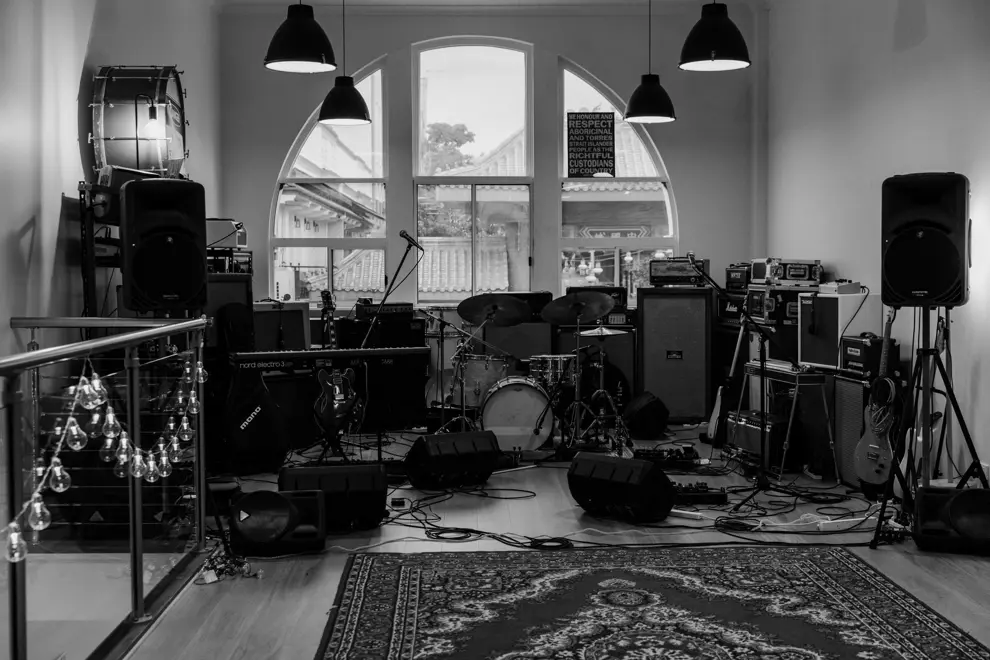It’s no secret that Brisbane/Meanjin’s venues are struggling. Every week, there’s a new story about a live music joint on the verge of shutting down. This week’s winner? Season Three, an independent Fortitude Valley venue set to be evicted after this weekend (May 11).
“I wish there was a big dramatic story,” owner Nick Smethurst explains to The Music. “I love a big, dramatic story - but it's not one. The landlord didn't want to renew our lease. That was it.”
With the building set to turn into offices, Smethurst is left without a space for Season Three - not that he isn’t searching. “I would love to find a way to keep it going, and we're currently talking to potential partners about what form that might take. I'm hoping to have something to announce about that in the next couple of weeks. But for now, this weekend's the last weekend. It's pretty upsetting.
“We worked really hard to build something safe and inclusive and meaningful and, dare I say, beautiful at times, and then it's gone. And it's not gone for big, exciting, dramatic reasons. It’s the mundanity of market capitalism. The landlord wants something different. It's their space, so they have every right. I mean, we've had people say, ‘Should I start a petition?’ No. I've tried really hard to be a good neighbor and a great tenant. I don't see any point in being needlessly annoying about it, not that I didn't fight. I had long conversations about any way we could continue the venture, but it didn't work out that way.”
Season Three was a unicorn venue of sorts - an all ages space, successfully functioning without a bar.
Don't miss a beat with our FREE daily newsletter
“There is this message that gets broadcast, so to speak, that says you need alcohol sales to make music solvent,” Smethurst says. “That this is the only economic route through which there can be creative prosperity. Okay, well, I've spent 18 months proving in action that you don't need that. Don't get me wrong, I love to go to a show and have a drink, but I don't think the two need to be holding hands so much. It's becoming harder and harder to have a truly independent platform, especially one that isn't tethered to alcohol sales. I'm not coming in telling anyone else how to suck eggs, I'm just saying that alternatives are valid.”
He argues that dry all-ages live music spaces are essential from any political standpoint, saying, “The right wing in politics says that they want kids off the streets, and that, ‘We want to stop youth crime.’ That's their thing. The left says that they want to invest in culture, cultural development. Fantastic. I've just spent 18 months building and sustaining an all ages space without alcohol, that young people are using as a proving ground to make their art. You don't have to commission a study into whether it works. I've done it for you. This thing works, and can hold itself up and can grow and be something important.”
But, if this model works, why are independent venues in Brisbane, and Australia as a whole, struggling so much? Well, apparently, it all comes down to economics.
“This thing that we do, this live music thing that so many of us have thrown our lives behind, whether we are organizing or performing or both, it doesn't make sense. It genuinely doesn't make sense, if you're looking at it along spreadsheet based economic lines. It's no longer possible to make a living - but I'm telling everyone something they already know. You can't make a sustainable living from writing music, releasing it, in a lot of cases, even from playing it live.
“As you have increasing corporate consolidation, well, it's going to get harder and harder to justify why a venue stays open in the first place, if you're running the books. You have large management organizations taking over most of the venues, which is the case, and there's one or two groups of people booking most of the rooms in town, because all of the independents kind of sold up the ladder to try and sustain themselves. I get it, you know? People consolidate. They consolidate to pool resources, which is an understandable impulse. You can see it with venues too, like, ‘Oh shit, our venue isn't working’, or, ‘Running bookings is hard’, or any of that, leads to, ‘We should consolidate’. I mean, how fussy can you be when the system and the powers that be have removed any economic viability from the creative arts?
“I just think it's sad that consolidation is the only choice, because I've yet to see many demonstrable examples of agents of capital - like large firms, large organizations - that genuinely care about supporting arts. Now, I'm not saying they're all working to disestablish creative endeavors. It might be a positive side effect of their campaign to help musicians sustain in this hellscape in which we exist. But that isn't the goal. The goal is to sell products. If you have shareholders, your primary motivation is maximizing shareholder value.”
But, despite that bleak portrayal of the live music industry, Smethurst is confident that DIY and independent venues will continue to exist - in whatever “hellscape” arises.
“I think I'm stealing someone's word for it here, but the creative ventures in Meanjin have always been transient. That is my experience going back to my youth, which is admittedly a minute ago, but I've seen wave after wave of great DIY venues in the city come and go, some very unceremoniously. But these passion projects, somebody has to put it all on the line to make these DIY ventures happen. And I've never seen anything like what those sorts of creative spaces can do. Let me be clear, not just here, but anywhere in the world that I've been fortunate enough to witness them, the passion and the genuineness that comes out of it, it can't be commodified. It can't be trained.
“It has to come down to why people are doing things. If you run a venue, if you run a bar, it’s because you genuinely care about live music. There are intensely passionate people involved in the local community. We turn up each week because we have an investment in local culture and seeing it grow and work and sustain.
“It's fine for all of us to be despondent about the loss of rooms. It's fine of us to sit a moment in contemplation or even depression. It's fine. But what we can do is work together, because the only way to fight influence from the top down is to work together from the bottom up. We can work together. You can come out and support. So it's not about just supporting the art that you like. It's about supporting the idea of local art in the first place, you know? And I'm not saying you have to go to every show for bands you dislike, but just stand as an avid champion for this stuff. It's important that people come together around things that they say they care about.”
Season Three will shut down next week. To show your support, come to their closing weekend, featuring a line-up of Convulsing, Plainer, Quiet Steps, Blue Diner, and many more. Find details below.
This piece of content has been assisted by the Australian Government through Music Australia and Creative Australia, its arts funding and advisory body

















